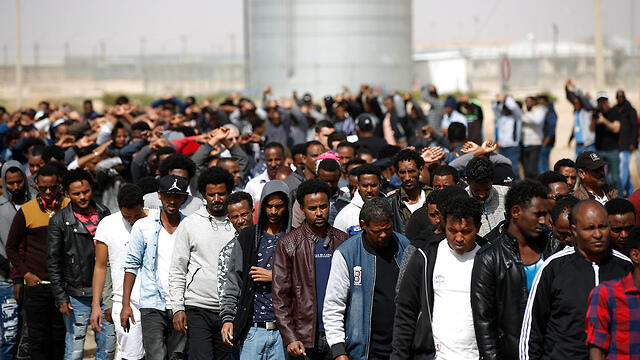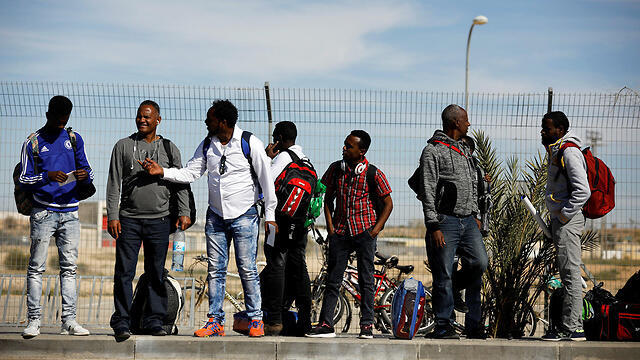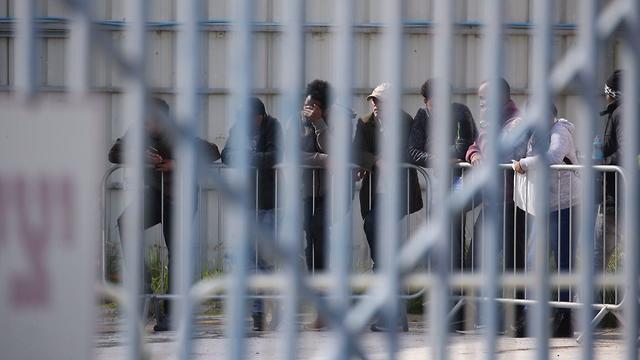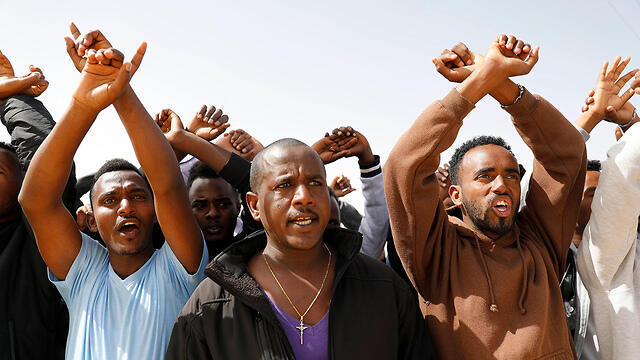Getting your Trinity Audio player ready...
The number of asylum seekers and illegal immigrants held in detention decreased in 2017, but there were still no improvements in the conditions of their detention, especially in regards to overcrowding, the Hotline for Refugees and Migrants revealed Tuesday in its annual report on the issue.
The report, as stated by the organization, "focuses on issues including conditions for transgender inmates separated in solitary confinement, the detention of Darfuri asylum seekers during the year in opposition to the state’s policy, and the handcuffing of inmates during medical examinations."
It mentioned that "the majority of those held in detention facilities are asylum seekers from Eritrea and Sudan that the Israeli government does not deport to their home country. Others are migrant workers or tourists whose visas expired or who violated the terms of their visa."
During the course of the past year, the organization observed the conditions in four detention facilities: Saharonim, Givon, Yahalom and Holot—which closed two weeks ago.
The report exposed that overcrowding in the aforementioned facilities stemmed from a decision by the Israel Prison Service (IPS) to reduce the number of utilized cells and not the number of inmates per cell.
The report also noted that in the Saharonim facility, there was a marked improvement last year in providing detainees with social welfare and mental health services, as well as in the processing of complaints of violence by immigration inspectors.
In the Givon Prison facility there was an increase in the number of cases in which the organization's representatives were prevented from visiting detainees, even though the visitations were coordinated and approved by the IPS.
The report then went into detail exposing the harsh conditions endured by transgender detainees in the facilities, giving examples of cases where the treatment of said detainees violated their human rights.
In one such case, a transgender detainee was held in solitary confinement for more than a month because of an IPS procedure, according to which "in any case in which a prisoner is received whose identity is not unequivocal, it is necessary to maintain conditions of separation for fear of harming the detainee or others."
During her detention at the Givon facility, the detainee was not able to take the gender reassignment hormones she regularly took and was not allowed to wear women's clothing or wear a wig. The report also stated that the prison guards insisted on referring to her as a male.
Asylum seekers and illegal migrants are imprisoned for administrative proceedings concerning immigration and not because they are in a criminal proceeding or because they pose a threat to society. Nevertheless, the report shows that the IPS tends to handcuff them even during hospitalization or medical examination.
A detainee from the Saharonim facility testified that he had been hospitalized for three days in which he was handcuffed in one hand to the bed except for a short respite during an medical imaging examination.
Another detainee held at Givon recounted a time in which he fainted, and when he woke up he discovered that he was handcuffed and connected to an IV.
Shirley Racah, Executive Director of the Hotline for Refugees and Migrants, denounced the state's treatment of asylum seekers and illegal migrants
"For years now Israel has been arresting people as an alternative to a proper immigration policy and refuses to grant status to those who deserve it or to allow detention alternatives to those who are destined for deportation," she stated. "We are standing at the cusp of an era in which asylum seekers will be imprisoned while innocent of any crime, and now more than ever it’s important to again iterate that detention does not constitute an immigration policy."
According the UNHCR’s instructions, "detention is an exceptional measure and can only be justified for a legitimate purpose."
"The detention of asylum seekers and migrants should be avoided, and priority given to other–more humane and economically efficient–measures, in order to control migration flows," the report concluded.
The IPS responded to the report by saying it will consider its critique seriously, as it sdoes that of any other human rights organization.
"It is clear that efforts have been made to improve the conditions of the inmates and their treatment," it added. "The report mentions improvements on several levels, including the prison guards' attitude towards the inmates, the response of the IPS to external factors, and the shortening of the length of stay of those held-up in the waiting cells.
"Due to the short time given to the IPS to respond, it is not possible to carry out in-depth examinations of the specific incidents (mentioned in the report—ed). As for the claims that transgender people are detained in solitary confinement—these are the separation conditions required to protect them, as distinct from isolation conditions."
It also added that "the prison staff is professionally trained and acts with sensitivity. The policy regarding the conditions of holding transgender people in the IPS has recently been updated."





